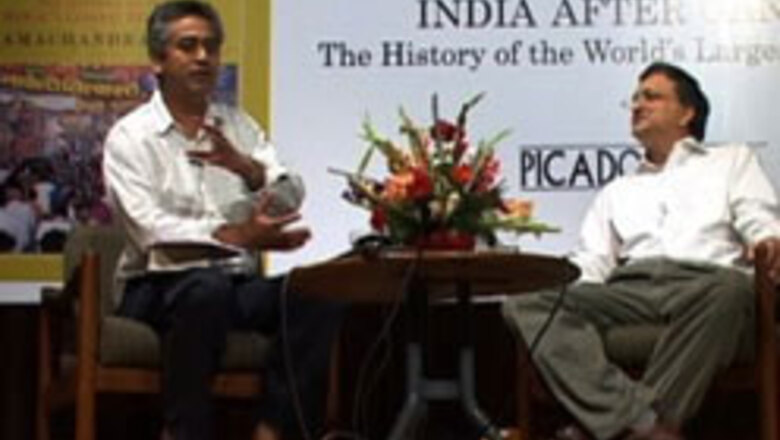
views
“Journalism is the first rough draft of history.”
New Delhi: The quote - widely credited to Washington Post publisher William Graham - perhaps defines best the complex and yet the fascinating relationship between history and journalism.
While both complement each other amid the constant “battle of importance” between events and processes and individuals and societies, modern day journalism and history - purely in terms of discourse - are also starkly different.
So is there a clash of interests between history and journalism? What are their meeting points?
And more importantly, just what exactly does a historian talk when he meets journalists?
Well, when the historian is eminent author, environmentalist and Gandhian Ramachandra Guha and audience are CNN-IBN journalists, it’s not a “talking to” that happens.
As CNN-IBN Editor-in-Chief Rajdeep Sardesai puts it in his introduction of the author, “He is one of the very few historians who ‘talk with’ and not ‘talk down to’ his audience and readers.”
So at the Expert Talk session at CNN-IBN Headquarters, Guha puts forth his idea and sense of history, his views being finely balanced by insightful questions from the journalists.
Journalism and history: the meeting points
Just how are journalism and history similar to each other? Guha explains, “The devil lies in the details. This holds true for both history and journalism.”
He supports his argument by referring to the attack on author Taslima Nasreen, a story that broke minutes before the interaction began. “It’s about arresting the quote or the anecdote from which you can build a narrative. For example, the fact that Taslima Nasreen has been attacked makes for news, but equally important are details like if she was hit with stones or bottles - blue coloured or black - etc are equally important. This, then makes into history books.”
However, he also criticises the media for “its over-involvement” with anecdotes, hence trivialising and diluting the larger picture as a result.
PAGE_BREAK
Similarly, historians too lose out on readers/audience vis-à-vis journalism because of their inherent tendency to get obsessed with the details, which may interest none. “So the way you juxtapose events and processes is the most important aspect of the relationship and that’s the challenge that all historians and journalists face,” says Guha.
Another similarity between historians and journalists seems to be the tendency of both to take India’s diversity for granted. That India is a fascinating country, with a rich history, is usually overlooked by overzealous historians and mediamen.
“Anyone who deals in creative visual representation in India is incredibly blessed. If I were born in Sweden or Norway I would have been a much happier citizen, but a much frustrated writer,” says Guha.
Years ago, author Vikram Seth’s novel An Equal Music was launched alongside Salman Rushdie’s The Moor’s Last Sigh, making many wonder at the coincidence of two Indian authors writing on music.
But Guha finds no coincidence here. “If two Norwegian writers had written a history of pencil between two months of each other, that would have been a coincidence. India is a universal subject,” he says.
That India offers a chronicler tremendous scope is evident in the country’s transformation from a colony to world’s largest democracy, from an agriculture-based economy to an industrial hub from feudal culture to a more liberal one.
What makes them different
However, the differences are equally stark. “While historians must distance themselves from the daily happenings and concentrating more on the larger implications, journalism is more about being involved with the grassroot,” explains Guha.
And of course, the key differentiator between the two will always remain William Graham’s famous saying.
Therefore, while both history and journalism continue to exercise considerable impact on masses as individual identities, it’s their ability to compliment each other that makes both desirable and interesting.













Comments
0 comment